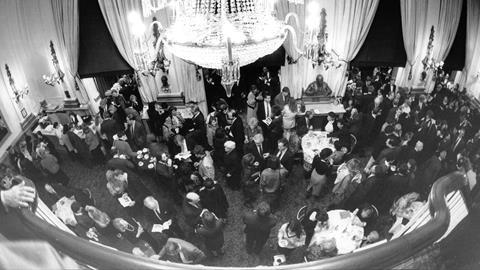In the last instalment of his career memoirs, Michael Simmons fears he is becoming a prisoner of his own creation. Things are starting to unravel...
Ron N, commercial partner at Janners – a firm which I had always admired – got on well with me in our interview. He suddenly turned to me: ‘Would you like to take over the whole firm?’

It transpired that Janners was in turmoil. There were differences between certain partners, some of whom wanted to leave. Ron introduced me to David H, the other leading partner, and we began negotiations to merge.
Being responsible for the treatise on the subject, I decided to do this merger by the book. That meant communicating with all my partners, at least daily, on progress – or the lack of it. This was a very difficult situation, as Janners had for a long time been in active discussion to merge with another law firm. Those discussions had stalled somewhat and in effect I was snatching Janners from the jaws of the other firm.
We planned to name the new firm Malkin Janners. I phoned Anthony Sumption, who by now was enjoying his retirement, to ask if he objected to his name being dropped from the firm. He did not.
The Janners partners were somewhat surprised at the terms of our recently introduced partnership deed, which provided for a rigidly set move to equality for all partners over a fixed period of years. I had resisted the adoption of this agreement but, once again, I was a lone voice in the wilderness.
The deed provided for equality irrespective of merit. We had a number of low-level conveyancing partners, with whom I had no desire to be equal. I raised this issue with John G. His response was illuminating: ‘Don’t worry about that. We’ll get rid of them long before the time comes to make them equal.’ So much for partnership collegiality.
The merger date was approaching and we were discussing how best to publicise it. My proposal was that we would pay the vicar of St Paul’s Church a small sum, as we had done before when we moved into Inigo House, to allow us to put up a marquee. Then we could have a series of parties to introduce partners, staff and clients of the two firms to each other. This had the advantage of imprinting the locality and our office on people’s minds, as well as being inexpensive. I felt that this would give us value for money.
This did not, however, appeal to one of my partners who had a client in the events business. It was resolved to put the matter in that client’s hands to organise a series of parties at eye-watering expense in standard locations, such as a boat on the Thames and a country estate. The only one which bore some relationship to our geographic location was a cocktail party in the Crush Bar of the Royal Opera House in Covent Garden.
I felt that we were needlessly chucking hard-earned money away, but nobody was listening to me. I happened to overhear a conversation between two of the junior partners which started: ‘In a firm with a reputation like ours…’. They had no idea how I and a few others had fought and made sacrifices to acquire that reputation. It had all come too easily to them.
I was increasingly feeling like a prisoner in a building of my own creation. We were now a firm of 29 partners, of whom the first 20 had equal equity shares. The overall headcount was in excess of 150. We had to rent a small office building round the corner at 15 King Street to accommodate the overflow.
What could possibly go wrong? We agreed that the compensation scheme was inadequate as it took no account of exceptional performance. A committee of the partners was formed to produce a draft scheme for consideration. None of the Janners partners was included and nor was I, despite my consultancy experience in that particular field. I did not feel I was being paranoid in suspecting that I was being gradually nudged aside. At the age of 56, I did not feel ready for retirement.
The previous financial year for Malkin Cullis & Sumption(MCS) had been particularly good, based largely on a property boom. That boom was now followed by a spectacular property bust.
The Janners partners whose turnover remained constant throughout, as they relied largely on repeat, recession-proof institutional business, were quite reasonably asking where all our budgeted fees had gone. We were faced with a drastic cashflow shortage. Cuts would have to be made.
Frankly, our scheduled drawings as partners in these particular circumstances were far too generous. The Janners partners and I, who were the grown-ups in the room, strongly advocated substantial cuts in our drawings. The MCS partners who I had managed to cushion from reality for so many years resisted strongly. ‘Cut anything you like but you can’t touch my drawings,’ said one of the former MCS property partners whose work had suddenly collapsed.
We were faced for the very first time with a dire situation; and most of the partners had grown soft as a result of previous success. They were in no position to deal with our predicament, which included a soaring overdraft at the bank.
The remuneration committee concluded its lengthy deliberations. As soon as I was apprised of the results, I was spitting blood. They were based solely on last year’s billings and took nothing else into account, including who had actually introduced the work.
For example, one of the senior MCS property partners had been acting largely for a Nigerian-owned property group to which I had introduced him. The work involved high-value acquisitions with correspondingly large fees. By the end of the year the client had been lost, but he still received the full credit for his billings.
By contrast I, who had spent much of the year on the Janners merger, which had affected my billings, was marked down and awarded a derisory sum. It was true that this exercise was only a dummy run but it showed how my contribution was considered by the other partners. I decided that the time had now come to leave.
I felt demotivated and disillusioned. Undoubtedly, my performance as senior partner was suffering. I did not help matters by referring to one group of my partners who were somewhat vertically challenged as ‘the pygmies’. I was summoned one afternoon at very short notice to an emergency partners’ meeting. The sole item on the agenda was my removal as senior partner and replacement by the aforesaid conveyancing partner. The lunatics were in charge of the asylum.
I was told afterwards that I behaved with dignity throughout the meeting. This surprised me. But the mayhem had only just started. A group of five of the former MCS partners, acting together, were in control. The Janners partners had joined in the resolution to oust me as senior partner. Why would they not? They had seen nothing from me to the contrary that merited my retention. But they were now in for a great surprise. They were told by the five MCS partners (the ‘Famous Five’) that they were no longer wanted and that the merger was over.
They consulted a friend of mine, a lawyer who also specialised in the partnership field. When they told him their story, his response was: ‘You got the wrong man’. There now followed a series of wholesale firings and the whole atmosphere of the firm became dire. Max R was originally to be retained by the Famous Five as their chief executive. However, he made the mistake of complaining about the short notice that I was given of the partners’ meeting where I was ousted. Of course, they were worried that I would rush to court to seek an injunction to prevent them proceeding with an unfair process. As if I would be bothered!
For being seen to support me, Max was duly fired. I was spending my time trying to reverse the decisions to sack certain vulnerable people and acting as an informal employment agency. I was not giving enough thought to my own position.
The Famous Five offered me a job as a consultant without an office: a sort of travelling salesman for them. I explored a few options but there was not too much on the market. The staff proved remarkably loyal to me. They organised a leaving party for me and I was presented with a lovely clock which I have to this day and which they paid for despite the fact that a number of them were losing their jobs.
The other partners were asked not to attend. A couple did and received a severe mauling from angry secretaries. I felt very touched. The staff certainly appreciated me, even if my partners did not.
The Janners partners had no difficulty in finding a new home with a much better firm. I’m sure they look back on the whole episode as an unpleasant dream. I swiftly made peace with them as they soon realised that they could rely on me to behave honourably in what turned out to be the protracted business of winding up our failed law firm.
I found a different abode for my team and myself, and entered into an entirely new and happy phase of my professional life. The Famous Five suffered the fate that they deserved. Like the Titanic, they sank without a trace.
Whatever happened to Inigo House? Ultimately, they gave up the premises. The landlords wanted to redevelop the building anyway. If you walk up Bedford Street today, you see a sandwich shop on the ground floor with offices above. Ah well!
































No comments yet